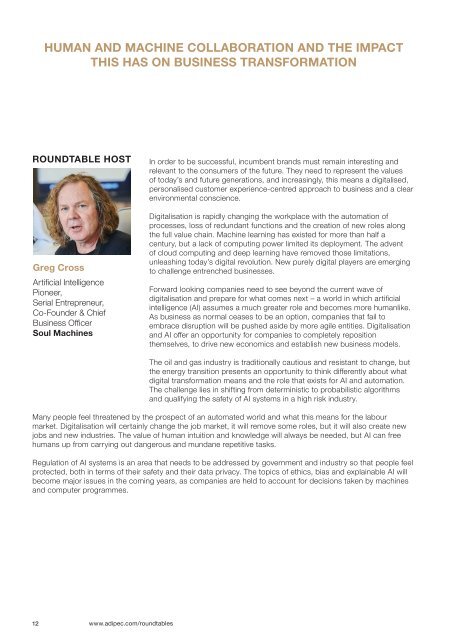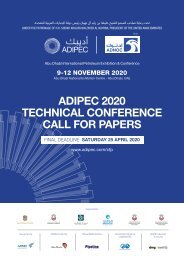ADIPEC Roundtable Whitepaper
Create successful ePaper yourself
Turn your PDF publications into a flip-book with our unique Google optimized e-Paper software.
HUMAN AND MACHINE COLLABORATION AND THE IMPACT<br />
THIS HAS ON BUSINESS TRANSFORMATION<br />
ROUNDTABLE HOST<br />
Greg Cross<br />
Artificial Intelligence<br />
Pioneer,<br />
Serial Entrepreneur,<br />
Co-Founder & Chief<br />
Business Officer<br />
Soul Machines<br />
In order to be successful, incumbent brands must remain interesting and<br />
relevant to the consumers of the future. They need to represent the values<br />
of today’s and future generations, and increasingly, this means a digitalised,<br />
personalised customer experience-centred approach to business and a clear<br />
environmental conscience.<br />
Digitalisation is rapidly changing the workplace with the automation of<br />
processes, loss of redundant functions and the creation of new roles along<br />
the full value chain. Machine learning has existed for more than half a<br />
century, but a lack of computing power limited its deployment. The advent<br />
of cloud computing and deep learning have removed those limitations,<br />
unleashing today’s digital revolution. New purely digital players are emerging<br />
to challenge entrenched businesses.<br />
Forward looking companies need to see beyond the current wave of<br />
digitalisation and prepare for what comes next – a world in which artificial<br />
intelligence (AI) assumes a much greater role and becomes more humanlike.<br />
As business as normal ceases to be an option, companies that fail to<br />
embrace disruption will be pushed aside by more agile entities. Digitalisation<br />
and AI offer an opportunity for companies to completely reposition<br />
themselves, to drive new economics and establish new business models.<br />
The oil and gas industry is traditionally cautious and resistant to change, but<br />
the energy transition presents an opportunity to think differently about what<br />
digital transformation means and the role that exists for AI and automation.<br />
The challenge lies in shifting from deterministic to probabilistic algorithms<br />
and qualifying the safety of AI systems in a high risk industry.<br />
Many people feel threatened by the prospect of an automated world and what this means for the labour<br />
market. Digitalisation will certainly change the job market, it will remove some roles, but it will also create new<br />
jobs and new industries. The value of human intuition and knowledge will always be needed, but AI can free<br />
humans up from carrying out dangerous and mundane repetitive tasks.<br />
Regulation of AI systems is an area that needs to be addressed by government and industry so that people feel<br />
protected, both in terms of their safety and their data privacy. The topics of ethics, bias and explainable AI will<br />
become major issues in the coming years, as companies are held to account for decisions taken by machines<br />
and computer programmes.<br />
12<br />
www.adipec.com/roundtables















